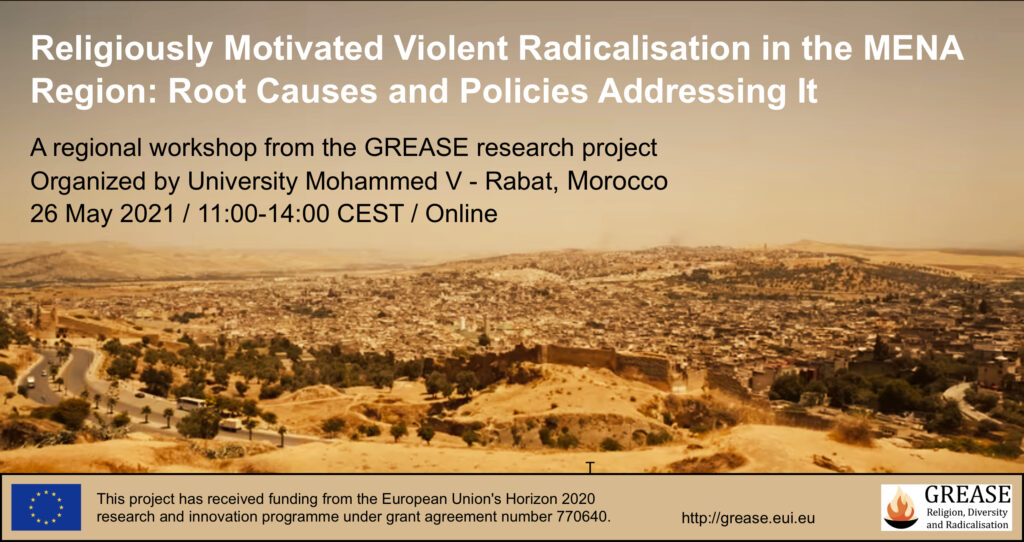Workshop completed. A recording is available. Please send requests to Valentina.Bettin@eui.eu
26 May 2021 / 11:00 – 14:00 CEST / Online (Zoom)
Languages: English & French (two-way interpreting service)
A GREASE Regional Workshop / Organised by University Mohammed V – Rabat, Morocco / Technical host: European University Institute – Florence, Italy

Background
Since the late 1970s and early 80s, many countries in the MENA region have experienced a rise in religious conservatism coupled with a process of radicalization of a small but increasingly visible part of their young populations. These developments have occurred in a context marked by economic, social, and political upheaval both at home and abroad.
Among the external events shaping Arab and Muslim public opinion during this period were the wars of Afghanistan (from the late 1970s onwards), the war in Bosnia (1990s), the ‘Intifidas’ of 1987 and 2000 in the occupied Palestinian territories, and the more recent wars in Iraq (from 2003) and Syria (from 2011).
These external events have been amplified within the MENA region and in several Arab-Muslim countries by socio-economic and political factors which have made arguments in favour of ‘political Islam’ more attractive for many, especially for youth. Such arguments have offered a simple explanation for the suffering of Muslim populations, pointing at their distance from the ‘true values of Islam’ and to the hatred of Westerners towards them.
Increasing poverty, a deepening of wealth inequality, youth unemployment, high levels of illiteracy and weak health care systems all contributed to widespread grievances. Such factors have all been made more visible and more serious by the coronavirus crisis that hit in 2020. Meanwhile, ‘traditional’ political parties, including left-wing parties, have been weakened.
This has led since the 1980s to the strengthening of radical Islamist currents under the influence of trends related to activist/jihadist interpretations of Saudi ‘Wahhabism’ and the Muslim ‘Brotherhood’. In more recent years (since 2014) small groups that claim an affinity to the ideology of Al Qaeda or Islamic State have taken the lead.
Research Approach
Within the framework of the EU-funded GREASE project involving multiple European and Asian institutions, researchers at the University Mohammed 5 – Rabat (UMVR) have been investigating the rise of the phenomenon of religiously inspired radicalisation in Morocco and Tunisia. UMVR researchers have carried out a critical review in these two countries of public policies aimed at managing the religious sphere and at strengthening certain forms of secularization within society.
Workshop Objectives
- To assess, in both quantitative and qualitative terms, the extent of religiously motivated violent radicalisation in the MENA region, especially in North Africa
- To analyse a) the mechanisms that induced and sustain this radicalisation and b) the forms it has taken
- To discuss the role of public policies, as well NGOs, in containing such radicalisation with the aim of pacifying society and reducing radical tensions within it
PROGRAMME
Moderator:
Mounir Zouiten, Professor, University Mohammed V – Rabat, Morocco
Speakers – Part 1
Mehdi Lahlou, Professor of Economics, National Institute of Statistics and Applied Economics and Associate Professor, University Mohammed V – Rabat, Morocco
> The dilemma of public policies to confront the radicalisation of young people in Morocco
Azzedine Akesbi, Professor, Education Planning and Counseling Center, Rabat, Morocco
> Violence in schools and their environment: What are the risks and implications for young people?
Discussant: Tina Magazzini, Research Fellow, Co-Coordinator of the GREASE project, European University Institute, Florence, Italy
— 10 minute break —
Speakers – Part 2
Ayhan Kaya, Professor, Bilgi University, Istanbul, Turkey
> History of political Islam in Turkey since the 1970s.
Djallil Lounass, Professor, Al Akhawayn University, Ifrane, Morocco
> The roots and causes of youth radicalization in Algeria, and political approaches to contain it
Larbi Bouguerra, Honorary Professor at the Faculty of Sciences of Tunis; Former Associate Research Director at CNRS-Paris, France
> The proliferation of young Tunisian jihadists after the 2011 Revolution and the institutional response
Mohamed Abdel-Wahhab Rafiqi, Researcher in Islamic studies, Sidi Mohamed Ben Abdallah University, Fez, Morocco
> The story of a radicalised youth between Morocco, Afghanistan and Saudi Arabia
Discussant: Anna Triandafyllidou, Ryerson University, Toronto, Canada and EUI, Florence, Italy
— Final hour Q&A —
